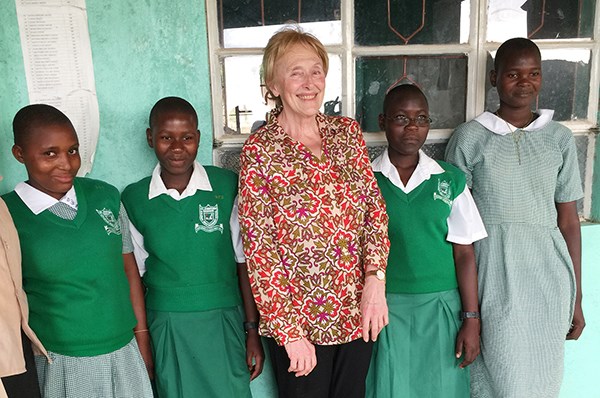When you meet Marg Huber, the thing that strikes you most is her calm demeanour.
We settled in for coffees at Bean Brackendale, and within the first minute, my hand hit her coffee mug and sent a big splash of hot coffee flying. She stayed calm and kept smiling gracefully as I mopped it up.
No big deal.
That serene demeanour has helped her career as a conflict resolution mediator and more recently in her peacemaking and international development work in Africa. She’s now a volunteer, which means she lives on no income, another surprising fact about a woman whose life has had many interesting turns.
Divorce can be negative for many, but for Huber, the end of her marriage in Vancouver turned out to be the start of a fuller, more interesting life.
“Your life falls apart, and sometimes out of what is left, you find a new direction. For me, it opened a really big door,” said Huber. “The divorce put me in another world. From there I met so many people, so many cultures, so much diversity in my community that I would never have met in my comfortable, middle-class neighbourhood. I had it good… but I built this amazing life.”
Huber had studied English and sociology at UСŔ¶ĘÓƵ, and she was working as a group leader at Family Services around the time her marriage dissolved. She heard about a mediation course through the Justice Institute of B.C and enrolled.
“I was sold. That is what I love… the opportunity for people to get together with a third party and come to an agreement… instead of taking the other to court.”
She started working for the Justice Institute, then started to develop training courses herself and became director of conflict resolution training for the institute.
Conflict resolution and meeting so many people at conferences around the world profoundly changed her. “It made me a more accepting person, a warmer person,” she said. “It was something I could never imagine.”
She was at a conflict resolution conference in Vancouver when she first saw the African Children’s Choir, another moment that altered the course of her life.
“I was blown away, like everybody, by the magic of these kids… that they could radiate joy the way they do. I have never seen anybody open people’s hearts the way this choir did. I was really struck.”
One of the founders asked her if she’d be willing to work with the children and teach conflict resolution strategies, so Huber gave up her job at the Justice Institute and found herself in Africa, including Uganda, Rwanda and Sudan, working with children as well as their parents and grandparents.
“Most of those kids lived with conflict in every part of their lives,” she explained.
“They dealt with conflict and the fallout. We were dealing with people who had never known peace.”
Huber and her team of young Africans went into 18 schools and taught 7,500 children about peacemaking. “They loved it. They loved being peacemakers. It was such a huge delight.”
But funding for the project was an issue, and the choir was run by Evangelists, so in 2003, Huber left to set up her own organization called Global Peace Hut.
About three years later, her life again took a new direction when she was diagnosed with breast cancer. She handed over the reins to Global Peace Hut to focus on fighting the disease.
Around that time, she discovered Squamish. She and a friend had decided they needed to rely on each other as friends and would buy a place together. They found their new home in Paradise Valley.
She has had no work income since 2007, so they rent out places on the property and have created a new community within their property, not dissimilar to the way Africans live, supporting each other and sharing resources.
At Paradise Valley, she said, “everyone pitches in and helps each other. If you have a load of dirt, can I exchange that for a dozen eggs? … It’s all the ties that bind us.”
She now works as a volunteer for Power of Education Africa, a recently formed charity that sponsors East African girls so they can attend high school. “We have an opportunity to make a big difference in Africa,” said Huber, who made her 13th or 14th visit to the continent earlier this year to help select the girls for the sponsorship. She says all the families are desperate to send their daughters tohuber school, to create a brighter future for them, so it’s difficult to select which students to sponsor.
Huber prefers not to be paid for her work for the charity. “Money can be a separator,” she explained. “If you have money and people don’t have as much, you always have the cushion of money.”
But she loves to work and has no plans to stop helping build communities, both in Africa and in Squamish. With the cancer kept at bay, she is able to keep moving forward and contributing to the world.
“My passion for this work will never die.”




